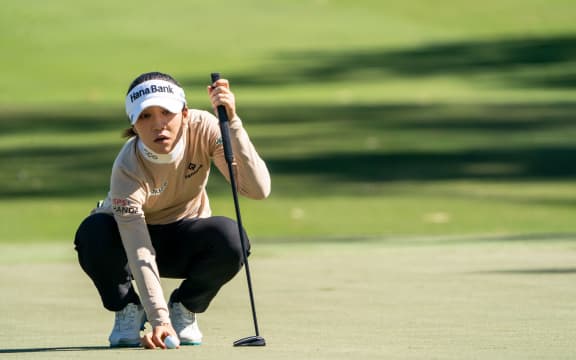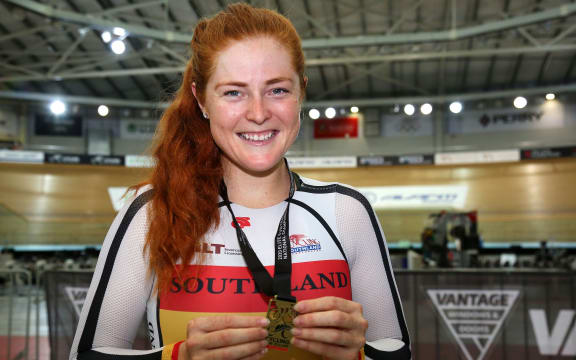It's time to talk about time of the month.
Pro golfer Lydia Ko made headlines on Sunday for talking about how having her period caused back pain, twisting her swing.
Even though about half the population experiences it - it's still a surprise when high performing athletes discuss it and experts want that to change.
Environmental exercise physiologist Dr Stacy Sims said she was delighted to hear Ko talk about it in such a matter of fact way.
In the interview, Ko was asked why she needed some physio - her response left the male reporter speechless.

Lydia Ko. Photo: PHOTOSPORT
"It's that time of the month. I know the ladies watching are probably like, 'yeah, I got you'. So, when that happens, my back gets really tight and I'm all twisted."
In 2016 Chinese Olympic swimmer Fu Yuanhui told reporters she hadn't done her best, because of stomach pain.
"I feel like I didn't swim very well today, I'd like to apologise to my teammates.
"My period started last night so I'm feeling pretty weak, and very tired. But this isn't an excuse, at the end of the day I just didn't swim very well. "
Why it is still so controversial to talk about? Dr Sims said people can see it as a weakness.
"When we think about what sport is, how sport originated, it's a very masculine thing.
"When we look at the origins of what it means to be successful in sport, we see it's that aggressive, it's that power.
"If you say the word period, all of a sudden that's not part of the masculine."
Dr Sims said no one wanted to admit that, especially in professional sport.
Interestingly, menstrual cycles can actually be used as an advantage rather than a negative. From the first day of bleeding to ovulation the body is super resilient to stress.
"The immune system is changed where it's more acutely in tune to fighting off virus and bacteria and parasites," Dr Sims said.
"We can recover better from a muscular skeletal standpoint, we have better neuromuscular control, we have better cognition [and] we have better fuel reserves."
This changes later in the cycle.
Dr Sims said this information is valuable when it comes to training athletes.
"We can work with those hormones to get really good strong training doses in low hormone phase leading up to and around ovulation when our body's really attuned to taking on high stress and adapting to it.
"Then we can start to work more technique, down load when our body's not so resilient to stress"
Non-athletes can also use this knowledge, Dr Sims said.
"They can immediately identify patterns, 'oh I always feel like this on day 22, 23, 24 of my cycle, I'm not going to make decisions or do anything hard.'
"Women who are in the C Suite are tracking their cycle to identify when they should have high pressure days so they can slam themselves with meetings because they know they can get through them."
Olympic track cyclist Kirstie Klingenberg said it was hard trying to understand how to work with her period at first.
"I went and saw a sports doctor actually and told him I hadn't had my period for like 150 days. His response to me was like, 'oh, you women, you complain when you get it, and you complain when you don't'. I just walked out."

Kirstie Klingenberg. Photo: Photosport
Years later, after further investigation and help from people like Dr Sims, she was diagnosed with endometriosis, a condition which makes period pain worse.
She said understanding her cycle, what was normal and what required more investigation changed her performance.
"I don't think I would have gone to the Olympics if I didn't have treatment for endometriosis, because the symptoms I was experiencing were so detrimental to my performance."
She's retired now but said understanding menstrual cycles is becoming a key part of sport - although given the reporters' reaction to Lydia Ko, clearly there is more work to be done.
Dr Sarah Beable, health co-lead for NZ's commonwealth games team, said there's been a lack of detailed research because most studies around athletes' performance have focused on men.
"Women have been terribly misrepresented and underrepresented in research, this is the first study we did last year on this kind of stuff and our elite female athletes, but we haven't looked into it.
"Internationally, women just have not been researched in big capacity or anything that we could draw conclusions on."
She was part of a group within High Performance New Zealand who asked New Zealand's top female athletes how their cycles affected them two years ago.
Thirty-six percent believed periods could have a negative impact on performance.
Dr Beable said knowing your own body and accepting that all days of the cycle might be different is the best way to make sure women are performing at their best.
"I think the first step is actually the knowledge of when do you get a period and have you noticed any symptoms either at the start of the cycle, sometimes mid-cycle around ovulation time."
She said whether you are a high performing athlete or an office worker, understanding hormones and cycles can be hugely helpful.


